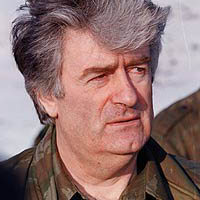Radovan Karadzic: The only key to Bosnia's bloody puzzle
 The Hague/ Belgrade - At best, Radovan Karadzic's war crimes trial at the International Criminal Tribunal for the former Yugoslavia (ICTY) offers what may be the last shot at shedding light on Serbia's role in the Bosnian war.
The Hague/ Belgrade - At best, Radovan Karadzic's war crimes trial at the International Criminal Tribunal for the former Yugoslavia (ICTY) offers what may be the last shot at shedding light on Serbia's role in the Bosnian war.
The former Bosnian Serb leader is seen to hold the key to the puzzle in the absence of the other two leading players on the Serb side of the Bosnian.
The former Serbian strongman Slobodan Milosevic died in his cell before the completion of his trial at the ICTY in 2006 and the wartime Bosnian Serb military chief Ratko Mladic remains on the run, 13 years after he was indicted for war crimes.
Bosnia's 1992-95 conflict was marked by horrific brutality and featured the worst massacre on European soil since the Hitler era - the 1995 Srebrenica massacre, where Serb forces rounded up and executed around 8,000 Muslim men and boys.
The victims of the machinery run by Karadzic and Mladic want justice. Bosnia's Muslim and Croat leaders will be waiting to see whether the Karadzic trial can prove that Milosevic and Serbia took part in ethnic cleansing.
That leaves the ICTY with the task of demonstrating whether or not Karadzic took orders from Milosevic and whether Mladic had regular Serbian - then formally Yugoslav - army units at his disposal for the war on the Muslims.
"It seems he is that crucial figure for our understanding of the relations in Bosnia in that period," says Natasa Kandic, the head of the Belgrade-based Humanitarian Law Fund. Kandic is a leading Serbian humanitarian rights activist who campaigns vigorously for the punishment of all those responsible for crimes committed during the violent breakup of the former Yugoslavia.
Much depends on what Karadzic sees as his best interest, she told the German Press Agency dpa.
"The effects of the trial depend on whether he will decide to protect Serbia, or if he will focus on Serbia's responsibility in the Bosnian war," she says.
The Bosnian war erupted in the spring of 1992 and lasted until the United States brokered peace between Milosevic and the presidents Croatian and Bosnian, Franjo Tudjman and Alija Izetbegovic, in late 1995.
Milosevic's death on March 11, 2006, came four years after ICTY prosecutors had set out to convict him of having directed the actions of his compatriots outside Serbia and weeks before the expected conclusion of his case.
Karadzic, who was arrested in Serbia on July 22, 2008, has so far insisted that he was swindled. He says high-ranking US officials promised him immunity from prosecution if he stepped away from politics after peace arrived.
"The question remains whether the trial will expose facts about the role of Serbia and its officials in genocide in Bosnia," Kandic says. "It may happen and it may have repercussions on Serbia - though in that context Mladic seems a far more dangerous man for Belgrade."
A possible effect of the Karadzic trial may be a revision of the ambiguous 2007 International Court of Justice (ICJ) ruling on Bosnia's lawsuit against Belgrade, which exonerated Serbia of genocide charges, while finding it had done nothing to stop it.
That also defused Bosnia's 100-billion-dollar compensation claim against Serbia, at least until new solid grounds for it emerges. In Bosnia's non-Serb area, the expectations of the Karadzic trial do not appear high.
Sarajevo-based political analyst Zeljko Latal notes that: "Disclosure that The Hague tribunal, for its own reasons, withheld documents proving Belgrade's links to the war during proceedings against Serbia at the ICJ ... had disheartened (people) in Bosnia." (dpa)